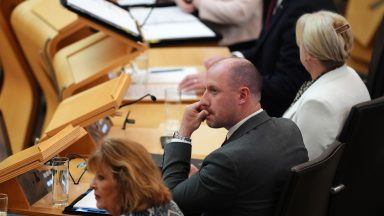There is no systemic problem at Creative Scotland despite the decision to fund a sexually explicit project, MSPs have been told.
The Rein project, which spoke of “genital contact” and a “sex party” in its funding application, was awarded £84,555 from the agency, but the majority was paid back following an outcry about its plans for “non-simulated” sex scenes.
The project was also given an initial £23,210 in 2022 for research and development, but a total of £76,196 has been paid back.
Appearing before the Constitution, Europe, External Affairs and Culture Committee at Holyrood on Thursday, Creative Scotland chief executive Iain Munro said there is no wider issue at the body.
“For us at Creative Scotland, we’re in no doubt the extent to which this is reputationally damaging, but I’m as concerned about the extent to which this is damaging for the sector as a whole and the risks it poses to undermine the case that we’ve been so diligently speaking about,” he said.
“I want to be quite clear though that one controversial award does not make a systemic problem with our processes, and I would want to reassure the committee and others more widely about the robustness of our processes.”
Robert Wilson, chairman of Creative Scotland, told the committee the agency is likely to be more cautious in future when it comes to funding awards.
“The senior leadership team at Creative Scotland, with the support of the board, has reviewed the process for open funding and have introduced new safeguards, including an additional stage of review for all applications that are recommended for funding,” he said.
“The board has also agreed to a more cautious approach to risk in terms of our future funding of projects with sexual content and those that involve vulnerable people or children.”
He said Mr Munro retains the support of the board, as does the senior team at the agency and their staff.
Staff at Creative Scotland and those involved in the Rein project have suffered abuse as a result, Mr Wilson said.
“A lot has been written and said about the matter in the media, online and elsewhere,” he said.
“Some of it has been accurate and measured, and some of it has not.
“However, an alarming amount of it has been offensive, dangerous, constituting attacks on the artists involved, marginalised parts of society, and unfortunately our staff.”
Mr Munro also pushed back against the accusation that Creative Scotland should have known about non-simulated scenes because of the use of the phrase “genital contact”.
“The mere mention of it does not mean real sex,” he said.
“Genital contact can be simulated – I would suggest you only need to switch on the TV or go to a streaming platform to see sexual activity of a simulated nature.”
Conservative deputy leader Meghan Gallacher said the Rein application spoke of the need for lubricant, which she said should have led to the agency assuming “this was much further than simulated sex”.
Mr Munro replied: “I can appreciate you reading it in that way, it wasn’t our reading of it.”
Follow STV News on WhatsApp
Scan the QR code on your mobile device for all the latest news from around the country


 PA Media
PA Media























